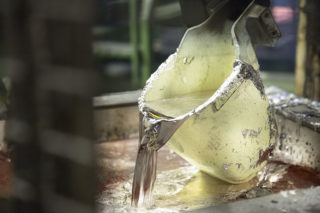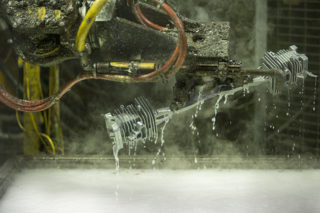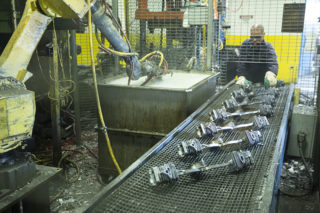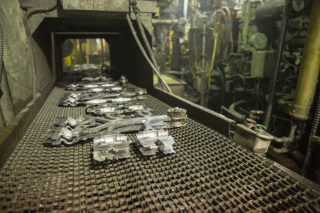At Kurt Die Casting, we focus on three primary aluminum die casting alloys: A380, A360, B390 — but have the capacity and capability to add more per request.
A380 is a popular aluminum alloy used in die casting. It is part of the aluminum-silicon family of alloys and is known for its excellent combination of strength, hardness, and corrosion resistance. The A380 alloy typically contains aluminum, silicon, copper, iron, and other elements in varying proportions. It is widely used in the automotive industry for casting components such as engine housings, transmission cases, and other structural parts.
A360 is an aluminum alloy with excellent pressure tightness and fluidity. It has a high silicon content and offers high corrosion resistance as well as high strength, even in elevated temperatures.
B390 is an aluminum alloy with high hardness and good wear resistance. This alloy is suitable for many applications including internal combustion engine pistons and cylinder bodies for compressors and brakes.
413: Very high silicon content, good fluidity but with poor anodizing quality.
ZA-27 Zinc Alloy: Is 1.5 to 3 times stronger than cast aluminum and has the tensile strength of grey or malleable cast iron. Machinability is very good to excellent.
Want to learn more about our aluminum die casting capabilities? Request a quote or contact Kurt Die Casting for more information.
Mechanical Properties of Aluminum Die Casting Alloys
| Alloy | Tensile Strength lbs./sq. in. (ksi) | Yield Strength (.2% offset) lbs./sq. in. (ksi) | Elongation % IN 2 in. | Brinell 500 Kg. Load 10mm Ball | Melting Range °F | Density lb. per cu. in. | Average Thermal Coefficient of thermal expansion (68-212F) | Electrical Conductivity | Thermal Conductivity |
|---|---|---|---|---|---|---|---|---|---|
| A380 | 47,000 (47) | 23,000 / (23) | 3.5 | 80 | 970- 1090 | 0.102 | 11.8 | 27 | 0.26 |
| A360 | 46,000 (46) | 24,000 / (24) | 3.5 | 80 | 1035 – 1105 | 0.095 | 11.6 | 37 | 35 |
| B390 | 46,000 (46) | 36,000 / (36) | < 1 | 120 | 950- 1200 | 0.096 | 9 |
Full Aluminum Die Casting Alloy Spectrum
| Si | Fe | Cu | Mn | Mg | Cr | Ni | Zn | Sn | Ti | Each | Total | AL | |
|---|---|---|---|---|---|---|---|---|---|---|---|---|---|
| A380 | 7.5 9.5 | 1.0 | 3.0 4.0 | 0.50 | 0.10 | — | 0.50 | 2.90 | 0.35 | — | — | 0.50 | Balance |
| A360 | 9.0 10.0 | 1.0 | 0.60 | 0.35 | 0.45 0.60 | — | .050 | 0.40 | 0.15 | — | — | 0.25 | Balance |
| B390 | 16.0 18.0 | 0.40 | 4.0 5.0 | 0.10 | 0.50 0.65 | — | — | 0.10 | — | 0.20 | 0.10 | 0.20 | Balance |



